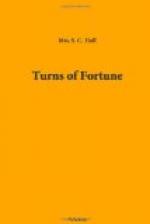“But to a mind like yours, the achieving an object must be so delightful!”
“Ay, Rose, so it is; but that sort of thing soon passes away, and we have no sooner obtained possession of one, than another still more desirable presents itself. How peaceful and happy you seem. Well, an idle mind must be a perpetual feast.”
“But I have not an idle mind, not an idle moment,” replied Rose, colouring a little; “my husband, my children, my humble household, the care of the parochial schools, now that poor Mr. Stokes has grown so infirm”—
“Yes, yes!” interrupted Helen; “and yet, Rose, when I look at you, even now, I cannot but think you were fitted for better things.”
“Better than learning how to occupy time profitably, and training souls for immortality!” she replied; “but you are worn and tired, let me wait upon you this one night, as I used long, long ago to do—let me wait upon my own dear cousin, instead of a menial, this one night, and to-morrow you shall see Edward and the children.”
The worn-hearted woman of the great world laid her face upon her cousin’s shoulder, and then fairly hid it in her bosom. Why it was, He only, who knows the mysterious workings of the human heart, can tell; but she wept long and very bitterly, assigning no cause for her tears, but sobbing and weeping like a sorrowing child, while the arms she had flung round her cousin’s neck prevented Rose from moving. Their tears once more mingled, as they had often done in childhood—once more—but not for long.
“Leave me alone for a little, and I will ring for my maid,” she said at last; “I am too artificial to be waited upon by you, Rose. It was otherwise when you used to twine gay poppies and bright flowers in my hair, telling me, at the same time, how much wiser it would have been to have chosen the less fading and more fragrant ones.”
“Her husband—and her children!” thought Helen; “if she had neither children nor husband, she would have been of such value to me now; noisy children, I dare say, troublesome and wearying. Native air! native air, indeed, ought to work wonders.” It would be hardly credited that Helen—the beauty—the admired—the woman of rank—bestowed quite as much trouble upon her morning toilette as if she had been in London. Such was her aching passion for universal sway, that she could not bear to be thought faded by her old lover, though he was only a farmer; and this trouble was taken despite bodily pain that would have worn a strong man to a skeleton.
It would be difficult to say whether Helen was pleased or displeased at finding Edward Lynne what might, without any flattery, be termed a country gentleman, betraying no emotion whatever at the sight of one who had caused him so much suffering, and only anxious to gratify her because she was his wife’s relative. She thought, and she was right, that she discovered pity, and not admiration, as he looked upon her.




